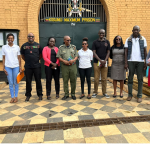- Toll Free: 0800720640
- info@nlas.go.ke
Background Information
HISTORY ON THE DEVELOPMENT OF A LEGAL FRAMEWORK FOR LEGAL AID IN KENYA
The process of developing the legal framework on access to justice begun in May 1998 when the Attorney General set up the Legal Aid Steering Committee comprising government departments (Judiciary, State Law Office, Probation and Aftercare, Children’s and of Prisons), the Kenya National Commission on Human Rights and representatives of civil society organizations (ICJ-K, FIDA-K, PLI and LSK).
The said committee called for an urgent need for a National legal aid scheme and identified possible model of legal aid delivery in Kenya. In 1999, the said committee commissioned a consultancy to design a pilot programme for testing suitable model(s) for a National Legal Aid Scheme. In its 2001 report (the Legal Education and Aid Programme: A Pilot Design) a framework for piloting legal aid and awareness in Kenya was proposed, but the same was not validated.
After the 2002 general elections and with a new government and a ministry (Ministry of Justice and Constitutional Affairs) mandated to among other things to give policy direction in the area of access to justice was created. The ministry set up a weekly legal aid clinic where all the legal staff would offer legal aid to citizens every Wednesday. Due to overwhelming demand for the services and lack of a framework, the ministry in 2005 engaged the consultants who developed the 2001 report on the design for legal aid to review report and align it to the new mandate and the Executive Order No.2 of 2003. The report was revised, validated by stakeholders in 2006 and presented to the Ministry in 2007.
As part of the implementation of the said report, in 2007 the Government established the National Steering Committee (NSC) for the National Legal Aid (and Awareness) Programme (NALEAP) vide a Gazette Notice No. 11589 of30th November 2007 with the mandate to among other things facilitate access to justice for all and provide policy direction for the establishment of a national legal aid scheme for Kenya informed by lessons drawn from piloting six thematic projects. The membership of the said committee was drawn from major stakeholders both state and non-state agencies involved in the administration of justice.
In April 2008, NALEAP was launched with the operationalization of the Secretariat while the six pilot projects were launched in 2009. The Programme adopted a partnership/collaborative approach, with partners drawn from MDAs, civil society organizations, professional organizations, community-based organizations and academic institutions. The six (6) pilot projects were established in Nairobi (2), Mombasa, Kisumu Nakuru, and Eldoret.
The six pilots were:
(i) The Nairobi Children’s Court Pilot Project;
This Pilot project focused on legal aid services for children and legal awareness on the rights of children. It provided limited legal representation to children in need of care and protection. Other services included legal advice, mediation and self-representation training.
(ii) The Mombasa Capital Offences Pilot Project;
This Pilot project focused on the provision of legal aid services to capital offenders in Mombasa, especially those charged with Robbery with Violence. The Pilot Project provided legal education to capital remandees in prisons in Coast region. The pilot project offered the following services; Counseling, Advice and Assistance and representation with respect to capital cases.
(iii) The Kisumu-Paralegal Services and Support Pilot Project;
The objective of the project was to build the capacity of paralegals and support their work by coordinating appropriate referrals to pro bono lawyers and institutions in the justice sector, governmental and non- governmental, as well as creating legal awareness to the general public. Its main objective was to test the efficacy of paralegal contribution to access to justice with a view to informing a legal framework for paralegal work in Kenya.
(iv)The Nakuru Children Justice Pilot Project;
This pilot project focused on children in contact and in conflict with the law. It offered legal advice, assistance, representation and mediation; counseling, family finding; referrals to children home; diversion and public awareness on the rights and care of children.
(v) The Moi University Law Clinic (Eldoret) Pilot Project;
This project provided legal education and aid including litigation and mediation. Its purpose was to provide lessons on how students can contribute to access to justice in Kenya. (vi)The Nairobi High Court Family Division Pilot Project;
The project mainly provided legal services in cases relating to; Matrimonial disputes, succession and domestic violence.
The Government successfully piloted the said projects between the years 2009- 2013, during which period over 25,000 Kenyans were granted legal aid. A summative evaluation of the programme was done in 2013 covering the piloting phase and the lessons drawn therefore informed the development of a draft Legal Aid Bill and a draft National Legal Aid and Awareness Policy. The Evaluation report recommended the scaling up of the National Legal Aid and Awareness Programme into a National Legal Aid Scheme.
The promulgation of the Constitution of Kenya in 2010, particularly articles 48, 50 and the Fifth Schedule which obligates the state to ensure access to justice for all, further gave the necessary impetus for the establishment of a legal and institutional framework for legal aid in Kenya.
The need to coordinate the legal aid services which was majorly offered by civil society organizations to ensure a coordinated and collaborative approach to legal aid and for purposes of standardization and quality assurance also informed the development of the legal and institutional framework.
The process of developing the Legal Aid Act and the National Legal Aid and Awareness Policy was through a wide stakeholder consultation. The Legal Aid Act, 2016 was enacted on the 26th of April 2016 and came into force on the 10th May 2016.



